Suchergebnisse
BIMpeco - Environmentally relevant product data in collaborative BIM environments
Construction products can pose a risk to the environment and health due to their pollutant content or releases. In the BIMpeco project, workflows and data structures for digital information management of this environmentally relevant product data are developed. For this purpose, the new ISO standards ISO 23387 and ISO 19650-1 are tested and synchronized with established process flows. The project results will be made available on an open-source basis and can be integrated into any Common Data Environment (CDE) that complies with the standards mentioned. The BIMpeco project is the first to lay the foundations for product information management of environmentally relevant properties in the CDE, covering the entire lifecycle and supply chain.
sustAIn4Build – KI-Kompetenz für nachhaltiges Gebäudemanagement in klimaneutralen Städten
Das Projekt sustAIn4Build zielt darauf ab, die Energieeffizienz und Nachhaltigkeit im Gebäudetechniksektor durch den gezielten Einsatz von Künstlicher Intelligenz (KI) zu steigern. Durch branchenspezifische Weiterbildungsmaßnahmen werden österreichische Unternehmen befähigt, KI-Technologien effektiv in ihre Prozesse zu integrieren, um ressourcenschonende, kosteneffiziente und nachhaltige Lösungen zu entwickeln. Dies stärkt deren Wettbewerbsfähigkeit und trägt zur Erreichung der europäischen Dekarbonisierungsziele bei.
sustAIn4Build - AI competence for sustainable building management in climate neutral cities
The objective of the project sustAIn4Build is to increase energy efficiency and sustainability in the building sector by using artificial intelligence (AI). Industry-specific training programs support Austrian companies to develop a workflow for integrating AI technologies into their processes, enabling them to develop resource-saving, cost-effective and sustainable solutions. This strengthens their competitiveness and contributes to the achievement of European decarbonisation goals.
Missing Link für die Planung CO2-neutraler Gebäude (6D-BIM-Terminal)
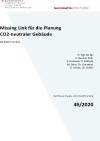
Das Projekt soll die Lücke zwischen FachkonsulentInnen und Building Information Modeling (BIM) Applikationen schließen. Daten, die für die Betrachtung von Kosten, Terminen und Nachhaltigkeitsaspekten notwendig sind, sollen bei BIM-Elementen ergänzt und in die jeweilige Fachplanungs-Software eingelesen werden können. Der Datenaustausch soll unter Verwendung der IFC-Schnittstelle nach ÖN A6241-2 und der Merkmale des ASI-Merkmalservers über eine zentrale Plattform, das „6D BIM-Terminal“, erfolgen.
Schriftenreihe
49/2020
H. Figl, M. Ilg, V. Huemer Kals, A. Krenauer, K. Battisti, M. Dörn, Ch. Doczekal, D. Venus, Ch. Sutter
Herausgeber: BMK
Deutsch, 46 Seiten
Downloads zur Publikation
Digitalisierung in der Stadtplanung: Von der Raumplanung bis zur Digitalisierung im Bauwesen (PBM_integrativ)
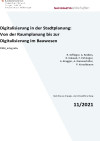
Das Projekt schafft einen Überblick zu den behördlichen, wirtschaftlichen und planerischen Grundlagen und Verflechtungen sowie zum Informationsfluss bzw. zu -defiziten für die Planungs-, Bau- und Betriebsphasen im Lebenszyklus von Gebäuden.
Schriftenreihe
11/2021
R. Giffinger, A. Redlein, R. Kalasek, F. Pühringer, A. Brugger, A. Kammerhofer, P. Kerschbaum
Herausgeber: BMK
Deutsch, 88 Seiten
Downloads zur Publikation
Materialintensität der Innenentwicklung - Ressourcenbewertung und Lokalisierung städtischer Entwicklungspotentiale (M-DAB2)
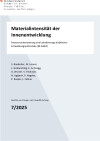
Bei der Bewertung von Innenentwicklungspotenzialen wurde erstmals auch die Materialintensität der Innenentwicklung (anfallende Stoffmengen) für unterschiedliche Entwicklungsvarianten berücksichtigt. Dabei wurde ein Methodenset zur holistischen Bewertung von Potenzialflächen und verschiedene Entwicklungsvarianten und -szenarien zur ressourcenschonenden Innenentwicklung geschaffen.
Schriftenreihe
7/2025
S. Bindreiter, W. Lorenz, L. Grabuschnig, E. A. Dengg, G. Wurzer, V. Pachauer, N. Ugljanin, P. Nageler, P. Rasper, J. Fellner
Herausgeber: BMK
Deutsch, 122 Seiten
Downloads zur Publikation
Scanning and data capturing for Integrated Resources and Energy Assessment using Building Information Modelling (SCI_BIM)
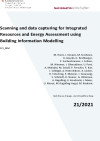
Ziel dieses Projekts ist, durch Kopplung unterschiedlicher digitaler Technologien und Methoden zur Datenerfassung- (Geometrie und materielle Zusammensetzung) und Modellierung (as-built BIM) die Steigerung der Ressourcen- und Energieeffizienz mittels Gamification Ansatz zu ermöglichen.
Schriftenreihe
21/2021
M. Honic, I. Kovacic, M. Sreckovic, G. Gourlis, H. Rechberger, P. Aschenbrenner, J. Fellner, M. Wimmer, I. Gilmutdinov, U. Pont, A. Mahdavi, M. Schuß, P. Ferschin, P. Kan, I. Schlögel, A. Hinterleitner, K. Löcker, R. Totschnig, P. Meixner, I. Greussnig, S. Schmidt, H. Steiner, G. Uhlariova, A. Ragoßnig, K. Kondracki, J. Maier, U. Moroz, M. Ragoßnig-Angst, M. Raskovic
Herausgeber: BMK
Deutsch, 62 Seiten
Downloads zur Publikation
Metadaten und Prozessmodelle für Open BIM in der TGA
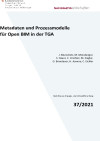
Ziel dieses Projektes ist es, eine Methodik für die Entwicklung von Daten- und Prozessmodellen zu konzipieren und diese zur Modellierung ausgewählter TGA (Technische Gebäudeausrüstung)-Systeme exemplarisch anzuwenden. Dazu werden schwerpunktmäßig, jedoch nicht ausschließlich, die erneuerbaren Heizungstechnologien Wärmepumpe, Solarthermie und Biomasse sowie Lüftungssysteme betrachtet. Die entwickelten Daten- und Prozessmodelle werden im Rahmen von zwei Pilotprojekten evaluiert. Die Projektergebnisse werden in einem TGA-BIM-Leitfaden publiziert und in BIM-Arbeitsgruppen in relevanten Gremien eingebracht.
Schriftenreihe
37/2021
J. Murschetz, M. Monsberger, S. Hauer, C. Urschler, M. Ziegler, G. Brandauer, H. Asmera, C. Eichler
Herausgeber: BMK
Deutsch, 48 Seiten
Downloads zur Publikation
GameOpSys - Gamification für die Optimierung des Energieverbrauchs von Gebäuden und übergeordneten Systemen
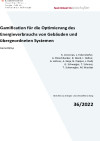
Zentrales Ziel ist die Entwicklung einer mobilen Anwendung, welche durch Partizipation des Nutzers und der Nutzerin als neue Daten- und Informationsquelle die Energieoptimierung und Planung von Gebäuden, Quartieren und übergeordneten Energiesystemen ermöglicht. Die Entwicklung der Anwendung erfolgt stark transdisziplinär und integriert dabei mathematische Methoden der Simulation und Optimierung sowie psychologische Aspekte des Nutzerverhaltens um neue Geschäftsmodelle zu erarbeiten und neue Märkte zu erschließen.
Schriftenreihe
36/2022
K. Corcoran, L. Eckerstorfer, A. Fleischhacker, B. Glock, I. Hafner, G. Lettner, A. Noja, N. Popper, J. Radl, G. Schweiger, T. Schranz, T. Schwengler, M. Wastian
Herausgeber: BMK
Deutsch, 50 Seiten
Downloads zur Publikation
Green BIM - Bauwerksbegrünung als Teil BIM-basierter Planung und Pflege
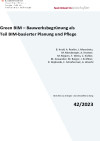
Verschmelzung der Begrünungs- und BIM-Planung zur friktionsfreien Planung, Ausführung, Umsetzung und Pflege. Durch die Analyse der Fallbeispiele wurde geprüft, inwieweit für die Gebäudebegrünung typische Planungsschritte mit branchentypischen Softwareprodukten BIM-gerecht bearbeitet werden können. Als Ergebnis wurden Ergänzungen im internationalen Standard für Datenstrukturen im Bauwesen (IFC / ISO 16739) angestrebt.
Schriftenreihe
42/2023
Herausgeber: BMK
Deutsch
Downloads zur Publikation
Digital Urban Mining Platform: Assessing the material composition of building stocks through coupling of BIM to GIS (BIMstocks)
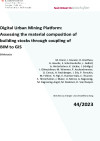
Hauptziel von BIMstocks ist die Entwicklung einer Methodik für die digitale Erfassung der materiellen Zusammensetzung des Baubestandes für die Modellierung einer digitalen Urban Mining Plattform sowie Prädiktion der Recyclingpotentiale.
Schriftenreihe
44/2023
M. Honic, I. Kovacic, D. Breitfuss, G. Gourlis, S. Schützenhofer, J. Gallistl, A. Hinterleitner, K. Löcker, I. Schlögel, I. Gilmutdinov, M. Wimmer, P. Aschenbrenner, O. Cencic, H. Rechberger, I. Erb, P. Ferschin, M. Fellner, H. Figl, V. Huemer-Kals, C. Thurner, S. Hinterholzer, J. Maier, U. Moroz, A. Ragossnig, M. Ragossnig-Angst, M. Raskovic, D. Van Rooyen
Herausgeber: BMK
Deutsch, 57 Seiten
Downloads zur Publikation
Wohnen 4.0 - Digitale Plattform für leistbares Wohnen
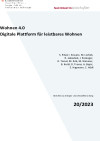
Im vorliegenden Forschungsvorhaben wurde das Rahmenwerk für die digitale Plattform "Wohnen 4.0" entwickelt, welche durch eine Parameter-Datenbank und Koppelung digitaler Werkzeuge die integrale Projektabwicklung unterstützt. Der Fokus lag dabei auf der Entwicklung und Nutzung von BIM-Objektbibliotheken für die modulare Off-Site Produktion im Geschoßwohnbau. Erstmalig wurden auch Nutzer:innen beteiligt und dadurch der zunehmend wichtiger werdende Aspekt der Partizipation integriert.
Schriftenreihe
20/2023
S. Pibal, I. Kovacic, M. Lorbek, R. Jakoubek, J. Reisinger, R. Temel, M. Ilcik, M. Wimmer, B. Kerbl, D. Travas, A. Bajric, E. Hagmann, C. Hödl
Herausgeber: BMK
Deutsch, 79 Seiten
Downloads zur Publikation
CO2-Demobau - Sondierung zur Durchführbarkeit CO2-neutraler Demonstrationsbaustellen
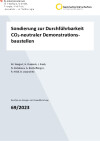
Durch Aufzeigen von grünen Innovationen, Vernetzung mit Stakeholdern der Baubranche und Anwendung der Erkenntnisse der Vorstudie "CO2 neutrale Baustelle" wird das Fundament für zukünftige CO2-neutrale Demonstrationsbaustellen gelegt. Diese Baustellen dienen als Best-Practice-Beispiele für die Bereiche Vergabe, Baubetriebsorganisation und -technologie.
Schriftenreihe
69/2023
M. Weigert, H. Daxbeck, J. Raab, N. Kisliakova, A. Bischofberger, R. Hölzl, B. Lepuschitz
Herausgeber: BMK
Deutsch, 100 Seiten
Downloads zur Publikation
Digitale Informationsmodelle für die Planung und Optimierung von Gebäuden und urbaner Energieinfrastruktur (DIM4Energy)
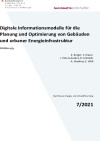
Digitale Informationsmodelle (DIM) spielen in urbanen Planungs- und Entscheidungsprozessen eine immer bedeutendere Rolle, angefangen bei einzelnen Gebäuden (Building Information Models, BIM) bis hin zu ganzen Städten (Urban Information Models, UIM). Für die Planung und Betriebsoptimierung von Plus-Energie-Quartieren könnten aus diesen bereits vorhandenen Modellen wertvolle Informationen gewonnen werden, sofern die entsprechenden Datenquellen und damit verbundenen Softwaretools richtig miteinander verknüpft würden.
Schriftenreihe
7/2021
K. Berger, S. Hauer, J. Peters-Anders, R. Schmidt, A. Shadrina, E. Widl
Herausgeber: BMK
Deutsch, 52 Seiten
Downloads zur Publikation
Digitale Technologien
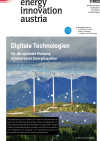
Digitale Technologien für die optimale Nutzung erneuerbarer Energiequellen.
energy innovation austria
1/2022
Herausgeber: BMK und Klima- und Energiefonds
Deutsch, 12 Seiten
Downloads zur Publikation
Digitale Transformation der österreichischen Bauwirtschaft und Auswirkungen auf die Erwerbstätigen
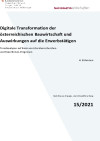
In einer Trendanalyse werden wahrscheinliche Auswirkungen der digitalen Transformation in der österreichischen Bauwirtschaft auf den Branchen-Arbeitsmarkt untersucht. Auf Basis von Feedback von BranchenexpertInnen wird für die kommenden fünf bis zehn Jahre analysiert, für welche Berufsgruppen digitalisierungsinduzierte Effekte eher zu einer steigenden vs. sinkenden Arbeitskraftnachfrage führen.
Schriftenreihe
15/2021
H. Eichmann
Herausgeber: BMK
Deutsch, 94 Seiten
Downloads zur Publikation
Materialressourcen der Stadt digitalisieren, analysieren und nachhaltig bewirtschaften (M-DAB)
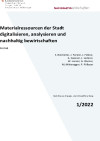
Im Forschungsvorhaben wurde untersucht, wie uns digitale Technologien unterstützen können die bestehenden und zukünftigen Materialressourcen im Bauwesen qualitativ (Baustoffe und deren Recycling) und quantitativ (Baustoffmengen) festzumachen.
Schriftenreihe
1/2022
S. Bindreiter, J. Forster, J. Fellner, A. Gassner, J. Lederer, W. Lorenz, G. Wurzer, M. Mitteregger, P. Pöllauer
Herausgeber: BMK
Deutsch, 124 Seiten
Downloads zur Publikation
Einsatz von Augmented Reality zur Abnahme und Qualitätssicherung auf Baustellen (AR-AQ-Bau)
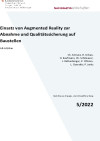
Ziel dieses Forschungsprojektes ist die Entwicklung eines baustellentauglichen Augmented-Reality-(AR)-Systems inklusive eines Remote-Expert-System und eines BIM-Closed-Loop Datenübertragungssystem zur Verbesserung der Bauqualität, Gebäudesicherheit und Energieeffizienz sowie zur Effizienzsteigerung im Baucontrolling.
Schriftenreihe
5/2022
Ch. Schranz, H. Urban, H. Kaufmann, Ch. Schönauer, J. Rattenberger, P. O’Brien, L. Ozeraitis, P. Jaritz
Deutsch, 62 Seiten
Downloads zur Publikation
Gamification als Möglichkeit für die Generierung von Daten zur energieorientierten Quartiersplanung (HotCity)
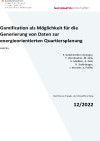
Ziel des Projekts war ein Funktionstest, ob durch Gamification kosteneffizient, rasch und zuverlässig ein aktueller Datensatz von energierelevanten Daten zur Quartiersplanung erhoben werden kann. Dies wurde am Beispiel der Potenzialermittlung von industriellen und gewerblichen Abwärmequellen in Wien und Graz ermittelt.
Schriftenreihe
12/2022
E. Gebetsroither-Geringer, T. Wernbacher, M. Göls, E. Meißner, A. Graf, R. Stollnberger, J. Worster, A. Peiffer
Herausgeber: BMK
Deutsch, 157 Seiten
Downloads zur Publikation
Digitale Transformation für größere Interaktivität in der TGA-Planung (digiaktiv)
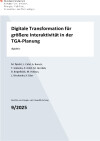
Das Projekt digiaktiv verfolgte, eine Verbesserung der Interoperabilität zwischen den unterschiedlichen Baugewerbegewerken durch neutrale, offene semantische Datenmodelle zu ermöglichen. Dabei trägt digiaktiv mittels digitaler Transformationsprozesse zur Steigerung der Planungsqualität und dem Betrieb von Bauwerken, sowie zur Minimierung des Schnittstellenrisikos bei.
Schriftenreihe
9/2025
M. Šipetić, J. Catal, A. Buruzs, T. Natiesta, P. Hölzl, M. Herzlieb, B. Beigelböck, M. Hollaus, L. Bischanka, K. Eder
Herausgeber: BMK
Deutsch, 62 Seiten
